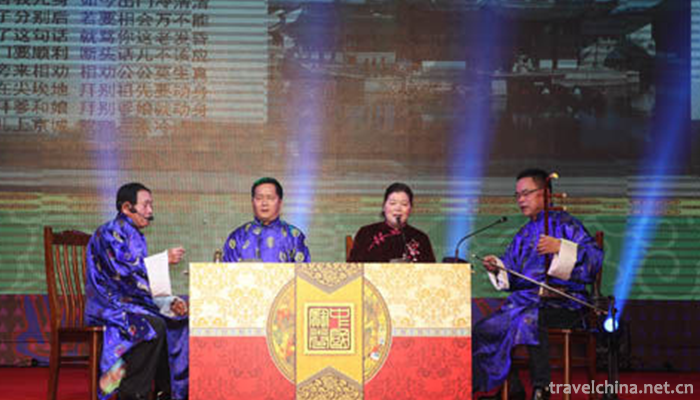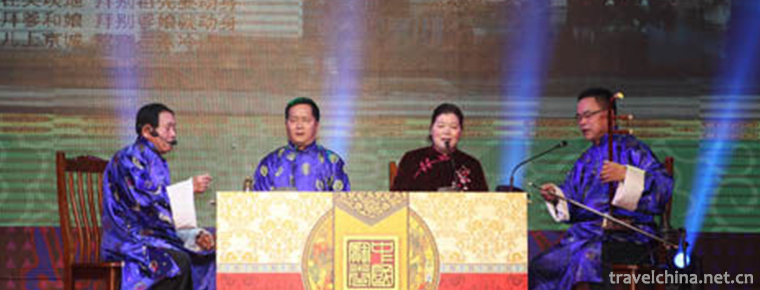Shaoxing Xuanjuan
Shaoxing Xuanjuan
Shaoxing Xuanjuan is a traditional rap art with religious color, which is mainly used to worship gods and pray for blessings. Since Tang Dynasty, it has developed into folk art in Qing Dynasty. The Song Book of Xuanjuan, or volume book, is commonly known as "Baojuan". When singing, artists put volumes on the table and sing according to the volumes, so they are called volumes.
On June 7, 2008, Shaoxing Xuanjuan, declared by Shaoxing County, Zhejiang Province, was approved by the State Council to be included in the second batch of national intangible cultural heritage lists.
historical origin
Shaoxing Xuanjuan is one of the local folk arts in Shaoxing. Before the founding of the People's Republic of China, Shaoxing Xuanjuan Ban was very active in Shaoxing City. Its singing was related to the custom of worshipping gods. The Chinese Encyclopedia of Opera Art Volume (Xuan Volume) contains: "In the Qing Dynasty, Guangxu Period and the early years of the Republic of China, Xuan Volume was extended to the south of the Yangtze River. Although it still serves as a sermon in a vast area centered around Shanghai, Hangzhou, Suzhou, Shaoxing and Ningbo, it has developed into a folk rap art", which basically conforms to the situation of Shaoxing Xuan Volume.
Although Xuanjuan sings in different roles, it has no professional skills and male and female accents. It mainly uses different timbres to express various characters. When one of them "played a role" in singing, the other two helped to sing "There is no Amitabha Buddha in the South".
In the old days, Xuanjuan artists had low social status and were not professionals. They had the habit of "father does not pass on sons". is concise and fluent, easy to read, when singing, you can read the book, read according to the book, without memorizing and reciting the work, fans can be invited to perform on a slight basis, therefore, Xuanjuan artists do not have strict teacher-acceptance relationship. The Xuanjuan class, headed by "Fish Position", is composed of many voluntary groups. It sings during the celebration of God's Birthday, birthday celebration, migration celebration and memorial service. Since 1950, Xuanjuan classes have been separated from time to time, and singing activities have been in fashion. Most of them are in the countryside.
Inheritance Significance
As one of the five major types of Shaoxing opera, Shaoxing Xuanjuan has won its own living space with its popular identity, people-friendly posture, popular language and simple performance, and maintained a relatively pure grassroots nature and original ecology. This makes Shaoxing Xuanjuan develop to a new height. This art form is gradually going out of the folk and expanding into the mainstream cultural field. This is indeed a good thing, but there are also many problems.


-
1.KangrinboqeMount KailashTime 2018-10-12
-
2.Mount Huangshan
Huangshan: World Cultural and Natural Heritage, World Geopark, National AAAAA Class Scenic Spot, National Scenic Spot, National Civilized Scenic Spot Demonstration Site, Top Ten Famous Mountains...
Time 2018-10-28 -
3.Hao River
Haohe River surrounds the old city of Nantong, like a gourd, like a Pearl chain, known as the "emerald necklace" of Nantong City. It is a national 5A tourist attraction.
Time 2018-12-06 -
4.qingming riverside landscape garden
Qingming Shanghe Garden is a large Song Dynasty cultural theme park constructed by the people's government of Kaifeng City in Henan Province
Time 2018-12-09 -
5.Dongping Lake Scenic Spot
The total area of Dongping Lake Scenic Spot is 627 square kilometers, the annual water surface is 209 square kilometers, the average water depth is 2.5 meters, and the total water storage is 4 billion
Time 2018-12-20 -
6.Xishuangbanna Primitive Forest Park
Xishuangbanna Primitive Forest Park, located in the east of Jinghong and north of Lancang River, is 8 kilometers away from the seat of the state capital.
Time 2019-02-25 -
7.Story telling in Beijing dialect with drum accompaniment
Jingyun Dagu is one of the Chinese folk songs. Developed from the popular wooden drum in Cangzhou and Hejian of Hebei Province, it was formed in Beijing and Tianjin. After the introduction of Hebei wo
Time 2019-05-07 -
8.Willowerwork
Willow knitting is one of the traditional handicraft products in China. In ancient times, people were just ordinary daily necessities. It was not until the late 20th century that they began to rise gr
Time 2019-05-14 -
9.Qinghai Lower String
Qinghai Xixian, which originated in the late Qing Dynasty, is one of the traditional folk arts native to Qinghai. It is a sitting and singing art, singing alone or in pairs.
Time 2019-06-11 -
10.Guan Hanqing
Guan Hanqing (before 1234) - about 1300 The original name is unknown. The word "Han Qing" is already Zhai. The Han nationality is a member of the state of Yuncheng (Shanxi province). Another
Time 2019-09-07 -
11.Gongmu mountain
Gongmu mountain is located 5 kilometers southwest of Yanyuan County, Liangshan Yi Autonomous Prefecture, Sichuan Province. It is named after the stone on the mountain because it looks like two male and female genitals.
Time 2020-10-16 -
12.Suining social security
By the end of 2019, there were 23400 registered unemployed people in Suining, with the registered unemployment rate of 3.62%. 855000 people participated in the basic endowment insurance for urban employees, an increase of 114800 over the end of last year.
Time 2020-12-16